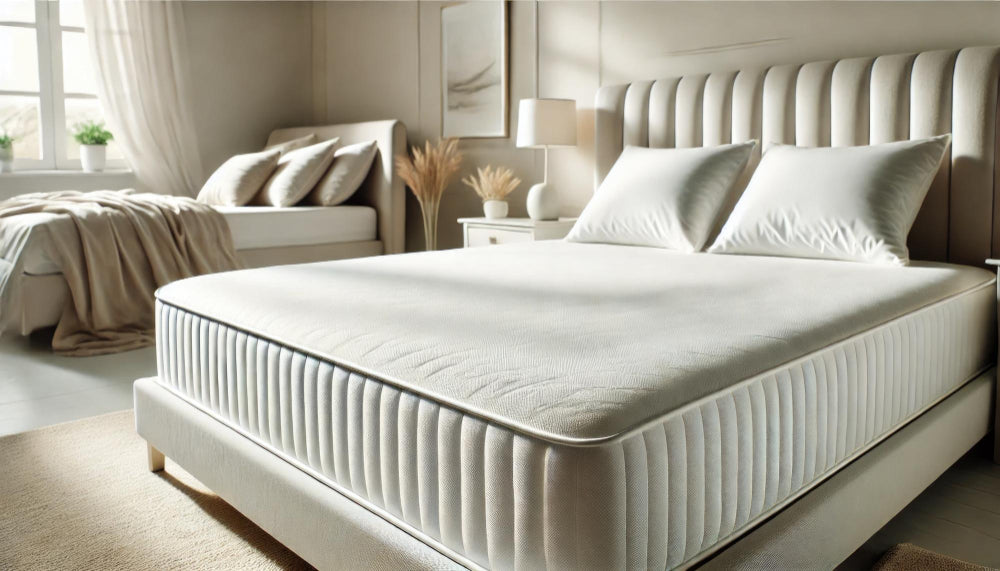Choosing the perfect mattress can feel like a daunting task. With so many options available, knowing which type will give you the best night’s sleep is essential. Two of the most popular choices are memory foam and hybrid mattress.
Let's look at the differences and benefits to help you make an informed decision.
What is a Memory Foam Mattress?
Memory foam mattress is made from viscoelastic foam, which moulds to your body shape in response to heat and pressure. This material was originally developed by NASA, and it’s known for providing a high level of comfort and support. They are designed to contour to your body, offering a customised fit that can help relieve pressure points.
What is a Hybrid Mattress?
Hybrid mattresses combine the best of both worlds, foam and traditional springs. Typically, it has a pocketed coil system at its core, providing the bounce and support of a spring mattress, but with a layer of memory foam (or latex) on top for added comfort. This combination gives you the comfort of a foam mattress with the traditional feel of a spring mattress.
Pros & Cons of a Memory Foam Mattress
Pros:
- Pressure Relief: It conforms to your body, this reduces pressure on sensitive areas like your shoulders and hips.
- Motion Isolation: If your partner tosses and turns, you’re less likely to feel it with this type of mattress as it absorbs movement.
- Great for Back & Side Sleepers: Its contouring nature supports your spine alignment, making it ideal for those sleeping in these positions.
Cons:
- Heat Retention: Traditional memory foam can trap heat, meaning it can get hot while you sleep.
- Lack of Bounce: This type of mattress won't offer the springy feel some people prefer.
- Heavier: These mattresses tend to be on the heavier side, making them more challenging to move or rotate.
Pros & Cons of a Hybrid Mattress
Pros:
- Balanced Support: They provide both support and cushioning, thanks to their mix of foam and springs.
- Cooling Properties: Many hybrids include cooling technology or more breathable materials, making them a great option for people who get hot at night.
- Bounciness: They maintain a springy feel, which can make movement easier.
Cons:
- Can Be Pricier: Hybrids often cost more due to their complex construction.
- Motion Transfer: Although better than a traditional spring mattress, hybrids may not isolate motion as well as memory foam.
- Heavier: Due to the combination of materials, they can be quite heavy.
Memory Foam vs. Hybrid Mattress
When you are doing a mattress comparison, it really comes down to personal preference and your sleep style. Memory foam is ideal for those who need pressure relief and prefer a mattress that hugs their body. On the other hand, hybrid mattress offer a balance of comfort and support, making them a versatile option for all types of sleepers.
Who Should Choose a Memory Foam Mattress?
If you’re a side sleeper, suffer from joint pain, or want a mattress that can minimise motion transfer, this might be the best choice for you. Its ability to mould to your body can relieve pressure and help align your spine, particularly if you tend to sleep on your side.
Who Should Choose a Hybrid Mattress?
If you’re looking for the bounce and support of a traditional mattress but with a little extra cushioning, this is a solid option. If you regularly switch between different sleeping positions you might benefit from the versatility of a hybrid. Plus, if you tend to get hot at night, a hybrid’s cooling properties could keep you more comfortable.
Ultimately, the choice between the two styles of mattresses depends on your sleep preferences and needs. You need to decide if you prefer the soft, body-hugging feel of memory foam, or the responsive bounce and support of a hybrid. Choosing the right mattress is key to ensuring the best night’s sleep.
Contact Duo Sleep today and explore our premium selection of mattresses to find your perfect match.

